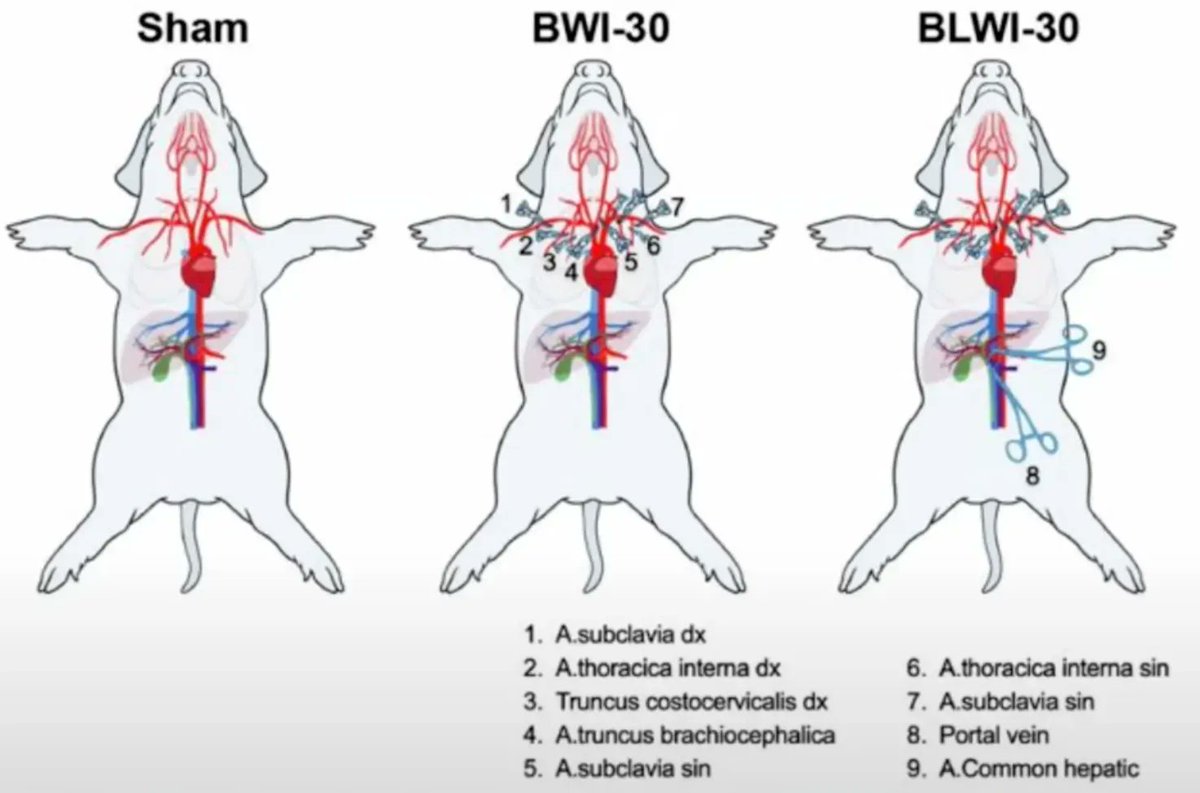In 2022, Yale scientists brought a dead pig back to life, an hour after its heart stopped.
They restored blood flow and cell function without a heartbeat, brain activity, or life support.
If that sounds impossible… wait till you see how they did it: 🧵
They restored blood flow and cell function without a heartbeat, brain activity, or life support.
If that sounds impossible… wait till you see how they did it: 🧵

First, let’s be clear:
This pig was clinically dead.
No heartbeat, circulation or breathing.
It stayed that way for a full hour. Long enough for massive tissue damage.
But then, they plugged it into a machine that did the unthinkable…
So what's this special machine?
This pig was clinically dead.
No heartbeat, circulation or breathing.
It stayed that way for a full hour. Long enough for massive tissue damage.
But then, they plugged it into a machine that did the unthinkable…
So what's this special machine?
It’s called OrganEx.
It’s a perfusion system that pushes a custom synthetic fluid through the veins of a dead body and those fluid contains:
Oxygen, Nutrients, Anti-inflammatories, and Drugs that block cell death
And it worked without needing the heart to beat.
It’s a perfusion system that pushes a custom synthetic fluid through the veins of a dead body and those fluid contains:
Oxygen, Nutrients, Anti-inflammatories, and Drugs that block cell death
And it worked without needing the heart to beat.

Here’s what happened next:
- Blood began circulating again
- Cells started taking in oxygen
- Kidneys, livers, even the heart began functioning again
The heart showed spontaneous contractions, even though the pig was technically still dead.
This begs the question “How is this even possible?”
- Blood began circulating again
- Cells started taking in oxygen
- Kidneys, livers, even the heart began functioning again
The heart showed spontaneous contractions, even though the pig was technically still dead.
This begs the question “How is this even possible?”
For decades, we believed death was a cliff.
Heart stops → Oxygen drops → Cells die → The end.
However, this study suggests death is more like a slow unraveling and if you act fast enough, you can interrupt that process.
Heart stops → Oxygen drops → Cells die → The end.
However, this study suggests death is more like a slow unraveling and if you act fast enough, you can interrupt that process.
The results were insane.
Compared to pigs treated with traditional ECMO (life support), the OrganEx pigs showed:
- Better organ structure
- Less inflammation
- Less hemorrhaging
- Far less cell death
They were recovering.
Here’s the crazier part…

Compared to pigs treated with traditional ECMO (life support), the OrganEx pigs showed:
- Better organ structure
- Less inflammation
- Less hemorrhaging
- Far less cell death
They were recovering.
Here’s the crazier part…

This wasn’t Yale’s first resurrection rodeo.
In 2019, the same team used a different system, BrainEx, to revive pig brains 4 hours after death.
They restored oxygen flow and cellular activity in the brain.
No consciousness, but neurons began firing again.
In 2019, the same team used a different system, BrainEx, to revive pig brains 4 hours after death.
They restored oxygen flow and cellular activity in the brain.
No consciousness, but neurons began firing again.
Now, put both studies together, and we’re looking at something extremely wild:
The boundaries of life, death, and recovery are far more flexible than we thought.
This is NOT a fluke but more so, a sign.
With the right tools, we might have far more time to reverse death than we’ve ever believed.
So what can this do in the real world?
The boundaries of life, death, and recovery are far more flexible than we thought.
This is NOT a fluke but more so, a sign.
With the right tools, we might have far more time to reverse death than we’ve ever believed.
So what can this do in the real world?
If developed further, OrganEx could:
· Prolong the viability of organs for transplant
· Give trauma victims more time to be saved
· Reduce damage from strokes, cardiac arrest, or sepsis
· Enable post-mortem treatment windows
This could reshape ERs, ICUs, and battlefield medicine.
· Prolong the viability of organs for transplant
· Give trauma victims more time to be saved
· Reduce damage from strokes, cardiac arrest, or sepsis
· Enable post-mortem treatment windows
This could reshape ERs, ICUs, and battlefield medicine.
Now, think about the implications:
Today, if someone flatlines for 5+ minutes, they’re often declared dead.
But what if we had an hour to act?
OrganEx could make the difference between saving a life, and watching it slip away.
However, of course, this raises massive ethical questions:
Today, if someone flatlines for 5+ minutes, they’re often declared dead.
But what if we had an hour to act?
OrganEx could make the difference between saving a life, and watching it slip away.
However, of course, this raises massive ethical questions:
- What is death, really?
- When should we try to bring someone back?
- What if the brain doesn’t recover, but the body does?
- Should this tech be used on humans at all?
Science is advancing faster than our moral frameworks.
- When should we try to bring someone back?
- What if the brain doesn’t recover, but the body does?
- Should this tech be used on humans at all?
Science is advancing faster than our moral frameworks.
But what’s undeniable is this:
Death is no longer an absolute boundary. It’s starting to look like a delayable condition.
We’ve entered an era where biology, chemistry, and computing can override the body’s shutdown sequence and that completely changes everything.
Death is no longer an absolute boundary. It’s starting to look like a delayable condition.
We’ve entered an era where biology, chemistry, and computing can override the body’s shutdown sequence and that completely changes everything.
This is what the future of medtech looks like:
→ Merging synthetic fluids with human biology
→ Using machines to extend life without traditional life support
→ Reframing death as a reversible cascade, not a final switch
The OrganEx team didn’t just save organs, they opened a portal to endless opportunities
→ Merging synthetic fluids with human biology
→ Using machines to extend life without traditional life support
→ Reframing death as a reversible cascade, not a final switch
The OrganEx team didn’t just save organs, they opened a portal to endless opportunities
We’re witnessing the birth of a new medical frontier:
Post-mortem care.
A world where death becomes a “pause,” not a “stop.”
Where trauma response is measured in hours, not minutes.
Where full-body recovery after death might be possible.
We’re not there yet but we’re certainly close.
Post-mortem care.
A world where death becomes a “pause,” not a “stop.”
Where trauma response is measured in hours, not minutes.
Where full-body recovery after death might be possible.
We’re not there yet but we’re certainly close.
This has massive implications for:
- Emergency medicine
- Organ transplantation
- Neurodegenerative research
- Space medicine
- Even cryonics and longevity tech
Because if we can bring pigs back… What’s stopping us from doing the same for people?
- Emergency medicine
- Organ transplantation
- Neurodegenerative research
- Space medicine
- Even cryonics and longevity tech
Because if we can bring pigs back… What’s stopping us from doing the same for people?

Let’s zoom out now.
OrganEx didn’t just revive a pig, it cracked open one of science’s biggest mysteries:
What happens after we “die”, and how much of that can we undo?
If you care about the future of medicine, don’t look to Big Pharma.
Look to breakthroughs like this.
OrganEx didn’t just revive a pig, it cracked open one of science’s biggest mysteries:
What happens after we “die”, and how much of that can we undo?
If you care about the future of medicine, don’t look to Big Pharma.
Look to breakthroughs like this.
P.S. @Yale Have posted about this as well.
You can check it out here:
You can check it out here:
https://x.com/Yale/status/1567502951886852096
Thanks for reading.
I’m Omar and I’m obsessed with the intersection of future tech, reading books, and digital health.
If you want more content that connect philosophy, medtech, and strategy…
Checkout my youtube channel:
youtube.com/@thestateofmed…
I’m Omar and I’m obsessed with the intersection of future tech, reading books, and digital health.
If you want more content that connect philosophy, medtech, and strategy…
Checkout my youtube channel:
youtube.com/@thestateofmed…
And that’s a wrap!
If you found this helpful:
1/. Follow @OmarMKhateeb for more educational threads.
2/. RT to spread this thread.
I will highly appreciate it!
If you found this helpful:
1/. Follow @OmarMKhateeb for more educational threads.
2/. RT to spread this thread.
I will highly appreciate it!
https://x.com/OmarMKhateeb/status/1953140278866362598
• • •
Missing some Tweet in this thread? You can try to
force a refresh










